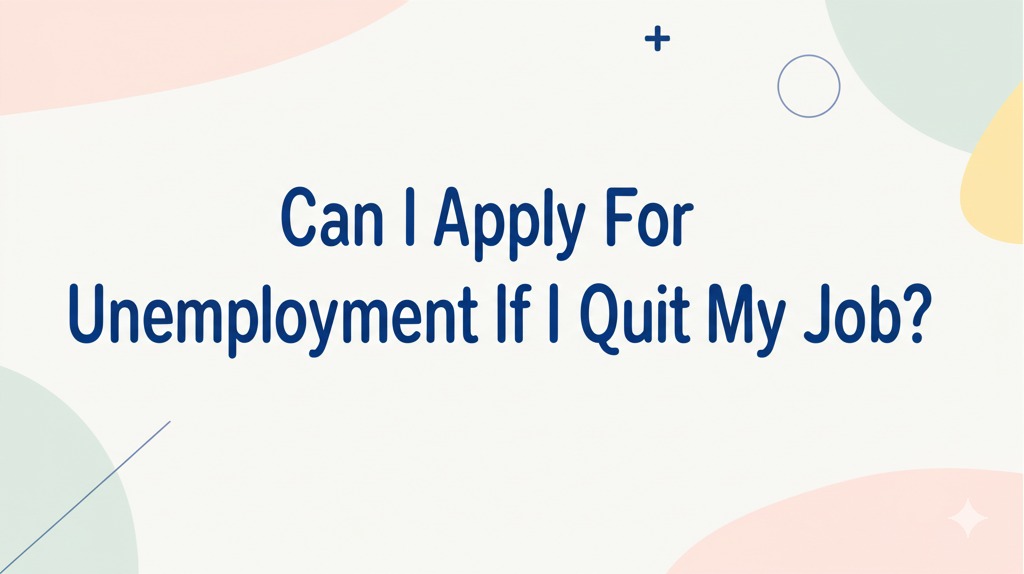
Leaving a job is a big decision, especially when your financial stability is on the line. One of the most common questions people ask after quitting is: “Can I apply for unemployment if I quit my job?” The short answer is — it depends. While unemployment benefits are generally reserved for those who are laid off, there are important exceptions and specific circumstances where quitting won’t disqualify you.
In this article, we’ll break down when you might still qualify, how to apply, and what to expect from the process. If you’re considering a job change or have recently resigned, this guide is a must-read.
Understanding Unemployment Benefits
Unemployment benefits are designed to support individuals who are out of work through no fault of their own. Typically, this means workers who are laid off due to business closures, downsizing, or similar reasons.
But quitting doesn’t always mean you’re out of luck. In certain situations, you can still be eligible for benefits — especially if your reasons for leaving are considered “good cause.”
What Does “Good Cause” Mean?
Definition of Good Cause
“Good cause” refers to a legally acceptable reason for leaving your job. Each state has its own definition, but common examples include:
- Unsafe working conditions
- Discrimination or harassment
- Significant changes in job duties or pay
- Health reasons (yours or a family member’s)
- Domestic violence
- Relocation due to a spouse’s job
Burden of Proof
If you quit and apply for unemployment, you must prove that your reason meets your state’s “good cause” criteria. This often requires:
- Documentation (emails, medical records, written complaints)
- Witness statements
- A paper trail showing you tried to resolve the issue with your employer
State-by-State Variations
Unemployment benefits are managed at the state level, meaning eligibility rules can vary significantly. For instance:
- California and New York tend to be more lenient in approving benefits for voluntary quits.
- Texas and Florida may have stricter requirements.
Before quitting, it’s wise to check with your state’s unemployment office or website. A quick search like “unemployment benefits after quitting [your state]” can lead you to accurate, up-to-date information.
How to Apply for Unemployment After Quitting
If you believe you left your job for good cause, here’s how to navigate the application process:
1. File a Claim Immediately
Don’t wait — apply for benefits as soon as you’re unemployed. Most states have online portals for fast filing.
2. Be Honest and Detailed
Clearly explain why you quit in your application. Vague statements like “personal reasons” may lead to automatic denials.
3. Prepare for an Interview
In many cases, you’ll have to participate in a phone interview with a claims examiner. Be ready to provide evidence supporting your claim.
4. Appeal If Necessary
If your initial claim is denied, don’t give up. Most states allow you to file an appeal, and many people are approved after presenting more details.
Common Scenarios: Do You Qualify?
Let’s look at some real-world examples to make things clearer.
✅ You Quit Due to Hostile Work Environment
If you have records of harassment or unsafe conditions and made an effort to report it, you may qualify.
❌ You Quit Because You Didn’t Like the Job
Unfortunately, disliking your job or wanting to pursue another opportunity is not considered “good cause.”
✅ You Left to Care for a Sick Family Member
In many states, this can qualify — especially if you provide medical documentation.
❌ You Quit Without Giving Notice and No Justification
Leaving without a legitimate reason usually disqualifies you from benefits.
Tips to Strengthen Your Case
If you’re planning to quit and think you might apply for unemployment, follow these tips:
- Document Everything: Keep copies of emails, letters, medical notes, or HR reports.
- Attempt Resolution First: Try to address the issue with your employer before quitting. This shows good faith.
- Consult an Expert: An employment lawyer or state workforce representative can offer guidance tailored to your situation.
Final Thoughts
So, can you apply for unemployment if you quit your job? The answer isn’t black and white. But if you left for good cause — and can prove it — there’s a strong chance you’ll be eligible for benefits.
Quitting is stressful enough. Don’t let the uncertainty around unemployment add to it. Take the time to understand your rights, document everything, and file confidently. If you’re unsure about your case, reach out to your state’s unemployment office for personalized advice.

Andre Cuevas provides career insights, job search strategies, and professional advice to help individuals navigate the job market and achieve their career goals.






